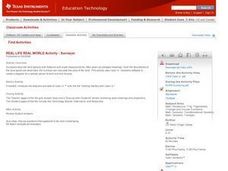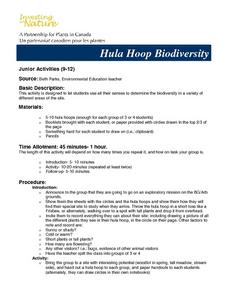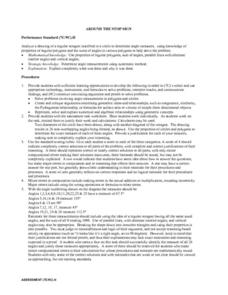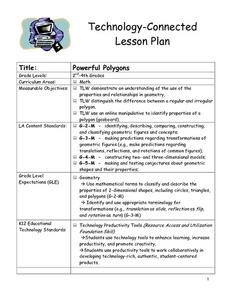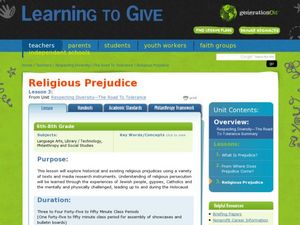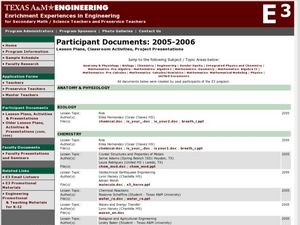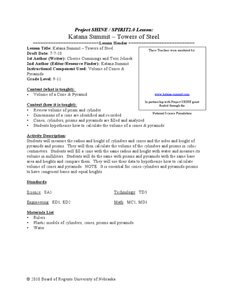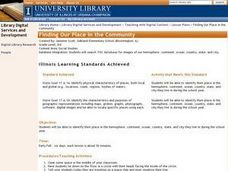Texas Instruments
REAL LIFE REAL WORLD Activity - Surveyor
Learners investigate surveying in this secondary mathematics lesson. They will explore a real world application of geometry and trigonometry as they create a plot plan using a geometry utility and calculate the area of the land parcel.
Curated OER
Hula Hoop Biodiversity
Students determine the biodiversity in a variety of different areas. They record everything they can about their site- including drawing a picture of all the different plants they see in their hula hoop, in the circle on their page.
Curated OER
Reference Angles
Learn how to measure the reference angles in degrees and radians. High schoolers find reference angles that are coterminal with a given angle.
Curated OER
Travel Triangles
Students demonstrate and understanding of the three types of angles using triangles and quadrilaterals. In this angles lesson plan, students learn about acute, obtuse and right angles. They use cut-outs to find the areas of triangles and...
Curated OER
Exploring the Orthocenter of a Triangle
Young mathematicians explore the concept of triangles as they construct altitudes of triangles to find the orthocenter. Learners construct their triangles using Cabri Jr. on their graphing calculators and find that the altitudes of a...
Curated OER
Around The Stop Sign
Students analyze a drawing of a regular octagon inscribed in a circle to determine angle measures, using knowledge of properties of regular polygons and the sums of angles in various polygons to help solve the problem. They use...
Curated OER
Gateway Arc Length
Learners differentiate and calculate the length of an arc. They define an arc and relate it to the area of a circle and integrate the function to solve the equations. High schoolers use their TI calculators to graph the equation.
Curated OER
Great Graphing
Students collect data, use a computer spreadsheet program to create various graphs, and compare the graphs. They state the findings of each graph in writing and decide which graph type best represents the data.
Curated OER
Oil Search
Students participate in a mock oil search game and attempt to find "oil" in a model oil field. They drill initially based on random guessing, but each time they drill they use prior knowledge to determine where to drill next. They must...
Curated OER
Powerful Polygons
Students scan the classroom to find different common shapes. They listen as the teacher defines polygon and regular polygon. The teacher demonstrates regular polygons via the Internet and the "Math is Fun" web site. Students go outside...
Curated OER
Composition of the Atom
High schoolers investigate the structure of the atom and its composition. In this atom structure lesson, students find the area of cut out circles and drop pens into the circles. They count the number of marks in the circles and relate...
Curated OER
Traditional American Indian Lodges
Students explore the mathematical properties of traditional American Indian lodges. They examine the effect of increasing sides of a polygon, calculate the surface area of prisms and cylinders, and construct a classroom size pyramid...
Curated OER
FAMOUS NAMES
Learners study some important people and events in French culture. They complete a worksheet and circle every item that is associated with France. They respond to written cues identifying the country's language and culture.
Curated OER
Respecting Diversity- The Road to Tolerance
Students use a graphic organizer to find similarities and differences in three religions. In this prejudice lesson plan, students understand the events leading up to the holocaust. Students understand that people who respected diversity...
Curated OER
Trigonometric Ratios
Learners investigate properties of the unit circle using sine, cosine and tangent. They analyze the answers to questions about the unit circle based on a right triangle.
Curated OER
Aboriginal Statistics
Fourth graders analyze statistics of Native Americans by creating graphs. In this data analysis lesson plan, 4th graders define different statistical terms and practice finding those statistics from groups of numerical information...
Curated OER
Geoboard Squares
Young scholars create squares of different sizes on a geoboard. They find and describe a pattern. Students use the pattern to determine the number of squares possible on a 10-by-10 geoboard. They create squares with a horizontal base...
Curated OER
Analyzing Birds and Planes
Students find a variety of topics and subjects in this instructional activity. In the math section of this instructional activity, students graph linear equations and analyze their data. They solve one and two step equations to find the...
Curated OER
Air Pollution:What's the Solution?
In this air pollution worksheet, students use an air quality map and answer eight questions about the colored areas on the map. Students compare red, orange, and yellow cities and identify the air quality in each city.
Curated OER
Towers of Steel
This lesson starts with geometers discussing how to find the volume of a cone and pyramid, using what they know about the volume of a cylinder or prism. Then, using the formulas, they calculate the volume of cones and...
Curated OER
Finding Our Place in the Community
Third graders search TDC database for images of our hemisphere, continent, ocean, country, state, and city. They identify their place in the hemisphere, continent, ocean, country, state, and city.
Curated OER
"Slice of Pi with Neo-Excel"
Students explore diameter, radius, and circumference. They define radius, diameter, and circumference on an online dictionary, identify objects in the room with a radius and a diameter, and calculate the radius and diameter of various...
Curated OER
Math All Around Us
Students identify real world problems from given story problems. In this story problem lesson, students find places, events or items in the school environment that can be used to create story problems. Students take a picture of the...
Curated OER
Discovering Pi
Sixth graders measure circumference and diameter to the nearest eighth of an inch, record measurements on a spreadsheet, and use the internet to complete a "scavenger hunt" of facts concerning pi.
